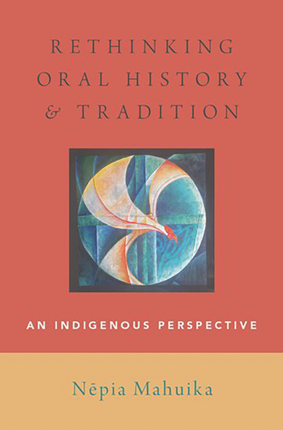Rethinking Oral History and Tradition: An Indigenous perspective - Nēpia Mahuika (2019)

Grounded in Ngāti Porou whakapapa and mātauranga-a-iwi, and challenging orthodox scholarship, this book re-assesses the meaning, form, politics and practice of oral history, honouring Indigenous oral histories as valid historical accounts and living phenomena crucial to cultural politics and identity.
Publication details
N. Mahuika. Oxford: Oxford University Press, 2019.
About the book
For many indigenous peoples, oral history is a living intergenerational phenomenon that is crucial to the transmission of our languages, cultural knowledge, politics, and identities. Indigenous oral histories are not merely traditions, myths, chants, or superstitions, but are valid historical accounts passed on vocally in various forms, forums, and practices. Rethinking Oral History and Tradition: An Indigenous Perspective provides a specific native and tribal account of the meaning, form, politics, and practice of oral history. It is a rethinking and critique of the popular and powerful ideas that now populate and define the fields of oral history and tradition, which have in the process displaced indigenous perspectives.
This book, drawing on indigenous voices, explores the overlaps and differences between the studies of oral history and of oral tradition, and urges scholars in both disciplines to revisit the way their fields think about orality, oral history methods, transmission, narrative, power, ethics, oral history theories, and politics. Indigenous knowledge and experience hold important contributions that have the potential to expand and develop robust academic thinking in the study of both oral history and tradition.
Further information
This book is part of the series marking the publication of Books of Mana (Otago University Press, 2025). It builds on the project Te Takarangi: Celebrating Māori publications and adds 30 titles to a selected list of 150 non-fiction books, led by Ngā Pae o te Māramatanga in collaboration with Royal Society Te Apārangi.
